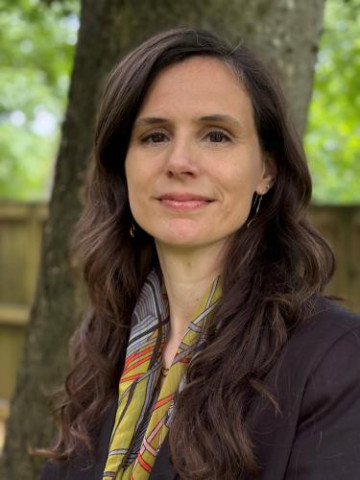
Did cafes help repair the social fabric after the November 13 attacks in Paris?
Published on 04/11/2025
How can community life be rebuilt after a terrorist attack has left day-to-day life in tatters? Amy Greiner Fehl and Mariann Györke, researchers at NEOMA, have co-authored a study that looks at the role cafes and restaurants play in restoring community ties. The research highlights how everyday consumption habits can become collective drivers of solidarity and resilience.
Terrorism continues to be a widespread phenomenon, with several thousand incidents recorded every year. In recent decades, these attacks have struck places and events that symbolise communal life in democratic societies: London's public transport system, the finish line of the Boston Marathon, bustling cafe terraces in Paris…
When the fabric of normal life is under attack, how can we rebuild the social unity that once held us together? The study co-authored by these NEOMA researchers and their colleague examined the importance of cafes, restaurants and other public spaces in fostering social reconstruction in the aftermath of the Paris terrorist attacks on November 13, 2015.
Violence in the heart of our cities
It was a Friday evening in autumn, and the cafe terraces were full, echoing with people’s laughter as they were enjoying a drink with friends, while many others were enjoying a rock concert at a popular local venue. Then, horror struck. The cafes and concert venue targeted in the French capital were singled out for their symbolic value: their friendly, sociable atmosphere, the diversity of their patrons, and the apparent freedom to enjoy life together.
The researchers invoke the concept of “cultural violence”: a non-random form of aggression deliberately directed at shared practices, familiar places and identity-defining symbols and culturally important consumption practices. In other words, precisely what café terraces in Paris represent: “third places” between home and work, where social connections are forged.
By striking these cafes and the concert venue, the November 13 attacks inflicted a deep cultural trauma: in addition to the many victims, an entire city was shaken to its core. The dismay was compounded by the shock of an irrevocably altered collective identity and shattered community spaces.
Consumption as an act of resistance
The researchers conducted an ethnographic study in the affected neighbourhoods that lasted over seven years. The investigation was structured around extended immersive periods in cafés, as well as discussions with local residents, shopkeepers, and community leaders. The research team also analysed the Paris city archives of the objects left at the memorials for the attacks to deepen their understanding of the symbolic significance of public spaces and community. Thanks to this extended follow-up, the researchers were able to capture the subtle evolution of the dynamics between restoring social bonds, commemorative practices, and communal spaces.
The cafes reopened in the days following the attack, and local residents made their way back — some immediately, even the next day, others more slowly, with many shedding tears. Returning to these public places became an act of resistance. Consumption took on not just a therapeutic role, but also a political and cultural dimension. It was a way of standing up to terror, of reclaiming the neighbourhood and saying: “We're still here.”
The study identifies two phases in this reconstruction: a first spontaneous stage, shaped by the need to be together and recreate connections, followed by a more integrative phase, where consumption acquires a new meaning. Going to “your” café became an affirmation of belonging to a community and ordering a drink a way of contributing to the shared memory of the neighbourhood. This type of consumption solidarity leads to healing and meaning-making to overcome shared trauma.
The research highlights that solidarity is not the sole province of the state or institutions. It also emerges in everyday gestures. As described by the authors, expressions of consumption solidarity - chatting with shopkeepers, organising vigils, and leaving messages or mementos — these are all acts which, when pieced together, trace the contours of a lasting sense of cohesion.
When consuming means belonging
This research changes the way we look at consumption, revealing how an act that may appear to be primarily commercial in nature may in fact represent community building. Following the attacks, it was in these everyday spaces that the people living in Paris’s 11th arrondissement rediscovered a sense of belonging: consuming together, recognizing each other as distinct yet part of the whole, and moving forward together.
In broader terms, the research shows that local businesses play a vital role in community healing. Café and small business owners provide the literal and figurative space for community members to come together, enacting solidarity themselves. The study also highlights the potential value of these findings for local decision-makers. As the tenth anniversary of the attacks draws near, the researchers' findings could inform the way local councils develop memorial policies and offer guidance to community groups planning solidarity actions. The research could also increase awareness among business owners of the vital role they play in fostering social cohesion.
In addition, the study urges us to rethink the way national and local government support communities damaged by deliberate and violent acts. Perhaps mending a community also means focusing on these ordinary spaces where we have a drink, share a meal... and rebuild connections? Providing a space to return to is the first step towards regaining a semblance of normality, especially a space that is open to all those who need to heal.
Find out more
Amy Greiner Fehl, Marlys J Mason, Mariann Györke. Consumption Solidarity: Healing Cultural Trauma Following Marketplace Violence, Journal of Consumer Research, 2025;, ucaf003, https://doi.org/10.1093/jcr/ucaf003
Related news
Professors

FEHL Amy
Amy Greiner Fehl is an Associate Professor of Marketing at NEOMA Business School. She teaches B2B Marketing and Sales & Business Development. With over 10 years of work experience in the healthcare and aerospace industries, she earned her PhD from Oklahoma State University and an MBA from Georgia Te

GYORKE Mariann
Mariann is an Assistant Professor of Management Control at NEOMA Business School. She researches accounting as a social and organizational practice, focusing on the construction of management control and accounting instruments in the context of consultants, in particular through representation and d



